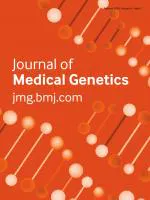Categoría: JMG First
-

Mosaic RASopathies concept: different skin lesions, same systemic manifestations?
BackgroundCutaneous epidermal nevi are genotypically diverse mosaic disorders. Pathogenic hotspot variants in HRAS, KRAS, and less frequently, NRAS and BRAF may cause isolated keratinocytic epidermal nevi and sebaceous nevi or several different syndrom…
-
Expanding the phenotype of Kleefstra syndrome: speech, language and cognition in 103 individuals
ObjectivesSpeech and language impairments are core features of the neurodevelopmental genetic condition Kleefstra syndrome. Communication has not been systematically examined to guide intervention recommendations. We define the speech, language and cog…
-
Homozygous SMAD6 variants in two unrelated patients with craniosynostosis and radioulnar synostosis
BackgroundSMAD6 encodes an intracellular inhibitor of the bone morphogenetic protein (BMP) signalling pathway. Until now, rare heterozygous loss-of-function variants in SMAD6 were demonstrated to increase the risk of disparate clinical disorders includ…
-
De novo heterozygous missense variants in CELSR1 as cause of fetal pleural effusions and progressive fetal hydrops
Fetal hydrops as detected by prenatal ultrasound usually carries a poor prognosis depending on the underlying aetiology. We describe the prenatal and postnatal clinical course of two unrelated female probands in whom de novo heterozygous missense varia…
-

Genotype and phenotype correlation of PHACTR1-related neurological disorders
BackgroundPHACTR1 (phosphatase and actin regulators) plays a key role in cortical migration and synaptic activity by binding and regulating G-actin and PPP1CA. This study aimed to expand the genotype and phenotype of patients with de novo variants in P…
-

Whole-exome sequencing reveals causative genetic variants for several overgrowth syndromes in molecularly negative Beckwith-Wiedemann spectrum
Background Beckwith-Wiedemann syndrome (BWS) is an imprinting disorder caused by (epi)genetic alterations at 11p15. Because approximately 20% of patients test negative via molecular testing of peripheral blood leukocytes, the concept of Beckwith-Wiedem…
-
GRN mutation spectrum and genotype-phenotype correlation in Chinese dementia patients: data from PUMCH dementia cohort
BackgroundMethodsThe GRN mutations, especially of the loss of function type, are causative of frontotemporal dementia (FTD). However, several GRN variants can be found in other neurodegenerative diseases, such as Alzheimer’s disease (AD) and Park…
-

Iron and risk of dementia: Mendelian randomisation analysis in UK Biobank
BackgroundBrain iron deposition is common in dementia, but whether serum iron is a causal risk factor is unknown. We aimed to determine whether genetic predisposition to higher serum iron status biomarkers increased risk of dementia and atrophy of grey…
-
Clinical implications of VUS reclassification in a single-centre series from application of ACMG/AMP classification rules specified for BRCA1/2
BackgroundBRCA1/2 testing is crucial to guide clinical decisions in patients with hereditary breast/ovarian cancer, but detection of variants of uncertain significance (VUSs) prevents proper management of carriers. The ENIGMA (Evidence-based Network fo…
-
Intermediate-effect size p.Arg637Gln in FHOD3 increases risk of HCM and is associated with an aggressive phenotype in homozygous carriers
Formin homology 2 domain-containing 3 (FHOD3) gene has emerged as one of the main non-sarcomeric genes associated with hypertrophic cardiomyopathy (HCM), but no cases of biallelic variants associated with disease have been described to date. From 2014 …
